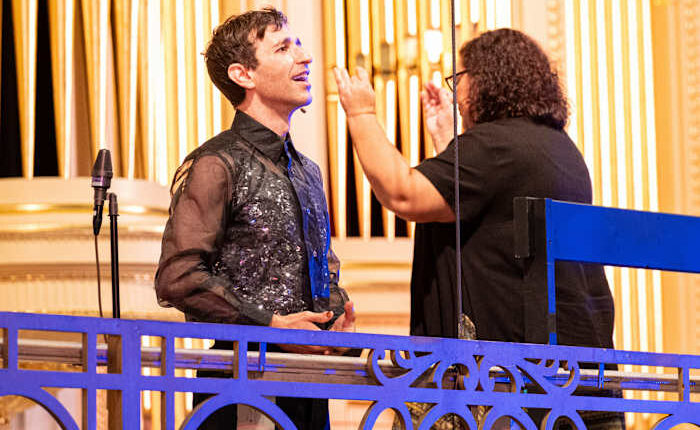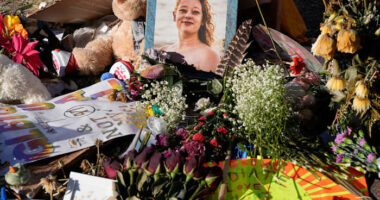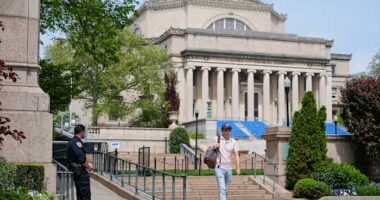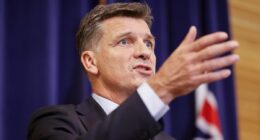Share this @internewscast.com

PHILADELPHIA – Anthony Roth Costanzo, who introduced $11 opera tickets to Philadelphia, aims to continue surprising the audience during the company’s upcoming season.
“It is very much opera. It’s dramatic, it’s cathartic, it’s collaborative in interdisciplinary ways,” Costanzo commented regarding Opera Philadelphia’s 50th anniversary season — the first he’s been able to plan since taking the reins of the financially fragile company last year. “But it’s different from what you might traditionally expect opera to be.”
To start, he selected a Rossini piece, with its premiere scheduled for Friday. Instead of opting for a well-known repertory piece, Costanzo chose the lesser-known “Il viaggio a Reims.” This production promises to be unconventional: Director Damiano Michieletto has transformed the original setting from an inn to an art gallery, where the portraits come to life and perform.
The subsequent offerings are even more daring. These include a multimedia piece by playwright Sarah Ruhl set to Vivaldi’s music — including “The Seasons” — featuring Costanzo, who continues to thrive as a countertenor. Following this is a world premiere with a libretto by Pulitzer-winner Michael R. Jackson and a score contributed by 10 different composers. Another new opera by Gregory Spears will highlight the chorus as the main attraction. Finally, bass-baritone Davóne Tines will perform in a “vaudevillian rendering” of a Langston Hughes poem.
“As I pieced everything together, I wondered how I could summarize this in just a few simple words,” Costanzo explained. “And what came to mind was: ‘Opera, but different.’ That became the slogan for the season.”
An offer too good to refuse
His pride in the lineup is understandable, especially given that when he took over it wasn’t certain there would even be a 2025-26 season.
The company was nearing bankruptcy and needed to quickly raise $4 million, he recalled.
He promptly introduced a “pick your price” policy, allowing people to purchase tickets to any seat starting at $11. (The website presents buyers with higher pricing options and encourages donations in addition to the ticket purchase. Season subscriptions at higher rates are still offered.)
“I said OK, I have to think like a venture capitalist,” Costanzo said. “We’re going to have to spend money to make money. Besides, he said, the old pricing system was projected to bring in only 8% of the revenue the company needed, so little was at risk from the new policy.
A full house is hard to beat
The publicity and good will generated by the move helped the company quickly raise $7 million in donations, more than enough to retire the debt. When tickets went on sale for 2024-25, all three operas sold out within three weeks, and the season ended with a surplus of $2.4 million.
Corrado Rovaris, the company’s longtime music director, was on the podium for the season-opening performance last fall of Missy Mazzoli’s “The Listeners,” a recent work having its U.S. premiere.
“It was amazing to see the reaction in the house,” he recalled. “Beautiful to see a full house but also to see such an enthusiastic house. Beautiful and very moving.”
Helen Little of New York City is one opera lover who was inspired by Costanzo’s pricing initiative to help the company financially.
“It’s a brilliant idea,” she said. “Because the tickets only cover a fraction of the cost of an opera. But the whole point is to spread good will, bring in new people, bring in young people, people who have never been to an opera. And good will is priceless.”
In a good portent for the growth of the company’s audience, two-thirds of those who chose the “pick your price option” had never bought tickets to Opera Philadelphia before, and most were under 45 years old. This year a similar percentage are either first-timers or repeats from last season.
As a result of the brighter financial outlook, the new season offers twice as many performances as last, though the budget is still substantially lower than it was in 2017, when the company launched an adventurous festival format that had several different works in performance over a period of two weeks.
Finding the magic number
Just how did Costanzo settle on that $11 figure?
“At first I thought it should be $25,” he said. “But the problem is that everywhere across the country I see ‘tickets starting at $25…’ and I thought people would see that and think, Oh, yeah, you can sit up in the top balcony.
“So I wanted to really distinguish it, and I thought a round number was less sticky … you don’t remember $15 or $10.”
Marc Scorca, president and CEO of Opera America, said he’s watching the company’s initiatives with great interest, but he cautions that it’s too soon to predict long-term victory.
“I appreciate that they’ve jumped into this with both feet,” he said. “Sometimes you need to have your back against the wall to take a bold experiment.
“I think the learning from it will be important not only to the company but to the field,” he said.
“And that will probably not play out for another couple of years until we see how much of that audience becomes a bona fide public for the company or just took advantage of an opportunity to experiment with something at a low price.”
Copyright 2025 The Associated Press. All rights reserved. This material may not be published, broadcast, rewritten or redistributed without permission.











